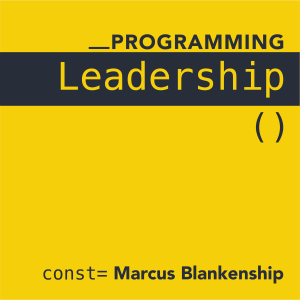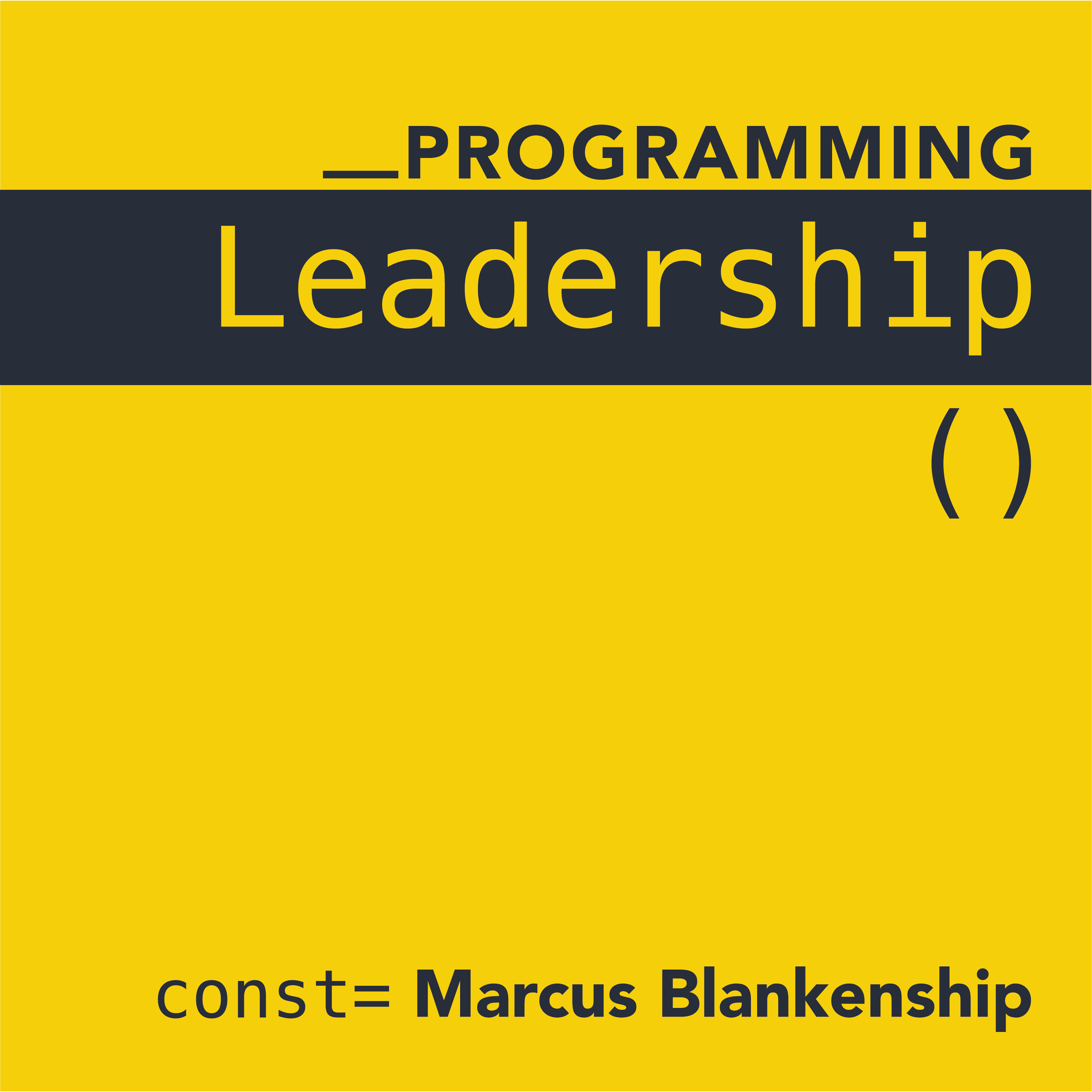Episodes

Thursday Aug 22, 2019
Putting the Emotion Into EQ with Etienne de Bruin
Thursday Aug 22, 2019
Thursday Aug 22, 2019
Emotional intelligence is essential to good leadership, but many CTO’s stress the importance of IQ instead. To move from contributor to manager, it’s a good idea to invest the time to explore EQ, as well as personality profiles to better understand how to manage people.
Show Notes
- Managing expectations
- Emotional Intelligence 2.0
- DISC profiles
- Avoidance and collaboration
- Dealing with conflict
- Real leadership
- It takes practice to change old habits
Links:

Thursday Aug 15, 2019
The Importance of Proper Feedback
Thursday Aug 15, 2019
Thursday Aug 15, 2019
Do people really crave feedback? That’s the assumption a lot of managers make, so in this episode we’ll talk about what feedback really means and how you can give it in a meaningful, productive manner.
Show Notes
- What is the history of feedback?
- Your output becomes their input
- The limits of perception
- Using attention properly
- Your people are NOT rose bushes
- Keeping things positive
Links:
- Sponsor: GitPrime

Thursday Aug 08, 2019
Lessons Learned on the Path to Managing with Amy Phillips and Aaron Randall
Thursday Aug 08, 2019
Thursday Aug 08, 2019
In this episode, we’re talking to Amy Phillips and Aaron Randall (CTO of Songkick) about the path from programmer to manager. How did they get there, what did they learn, and what can you learn from their experiences?
Show Notes
- What lessons were learned in the early phases of their careers?
- How do you change when the industry changes?
- The importance of having difficult conversations
- You can’t know all the answers
- Finding balance
- On peers, managers, and building a support network
- Promoting transparency, and open communication
- Prioritization and letting things go
Links:

Thursday Aug 01, 2019
Authentic Feedback
Thursday Aug 01, 2019
Thursday Aug 01, 2019
We’ve all experienced feedback that was unhelpful - but why was it that way? Supervisors want to motivate us, and bring out our best, but perhaps they don’t always think about the feedback they’re giving. Is it really helpful? Is it addressing the real problem? What’s the context? In this episode, we’ll look at how our perceptions can change how we respond, and why authentic feedback is genuinely helpful.
Show Notes
- Sometimes we ascribe motivations that aren’t there, causing us to provide feedback based on incorrect assumptions.
- A fundamental human trait is seeing the world with our own biases. You must be aware of your perceptual biases.
- Feedback is best when it’s based on tangible things, not just perceptions. Authentic feedback recognizes the difference between sensation and perception.
- Objective analysis will yield feedback that takes into account circumstances.
- Good feedback welcomes positive changes.
Links:

Thursday Jul 25, 2019
There’s Always More Information
Thursday Jul 25, 2019
Thursday Jul 25, 2019
Breaking a problem down can help you see it more clearly, and attack the issues wrapped up in that problem more effectively. Sometimes we tackle problems that are large or connected to other issues, and it can be helpful to take a step back, consider other perspectives, get more information, and try breaking things down and solving each issue individually.
Show Notes
- There’s always more information.
- Consider more sources of information.
- Challenge your assumptions, and try to integrate different points of view.
- Who are we not talking to? What are we not considering?
- Often the solution to one problem reveals other underlying problems that need solving.
- The more perspectives, the better.
- A four-part approach to systems thinking, DSRP: distinctions, systems, relationships, and perspectives.
Links:

Thursday Jul 18, 2019
Motivation is NaN (Not a Number)
Thursday Jul 18, 2019
Thursday Jul 18, 2019
What motivates your programmers? In this episode, Marcus looks at the various factors that impact motivation, and why one of his engineers just wasn’t grooving on a project. Chances are you’ve got teammates who feel the same way. Guess what? It’s not that they’re lacking in motivation, it’s that they’re no longer motivated by what’s being given to them.
Show Notes
- People ARE motivated, that’s why you hired them. They lose some of that when they aren’t given new challenges.
- Is it wise to allow risks just so you can keep people motivated?
- Problem solving is exciting, and engineers want to do exciting things.
Links:

Thursday Jul 11, 2019
Thursday Jul 11, 2019
There is an inherent difference between leaders and managers that is often overlooked. While most think that leaders are “born,” Katie Womersley, VP of Engineering at Buffer, disagrees. Leaders and managers both require skills that can be taught, and developing those employees from within the company can be the most timely and economically efficient way to do so. We also discuss the perception of status, authority, and vulnerability with the workplace.
Show Notes
- What is Buffer?
- Leaders vs. Managers
- Setting expectations for leadership growth
- Questions that threaten authority status
- Perception management and vulnerability
- Levels of career framework
- Katie’s journey into management
- Transitioning others into management and bumps along the way
- The “dark side” of management...is it real?
- Developing leaders from within the organization
- Katie’s favorite resources on leadership & management
Links:

Thursday Jul 04, 2019
Imagine the Possibilities: How to Break Ties That Hinder Our Potential
Thursday Jul 04, 2019
Thursday Jul 04, 2019
Often times people find themselves in a place where they feel trapped or stagnant in their lives. It can be trapped in a job or in a relationship and making a change may not always be the easiest thing to do. Because we are human, we find ourselves in situations where it is hard to leave or change because we are connected to people, systems or organizations.
In this episode of Programming Leadership, Jessica Kerr joins me to talk about the complex topic of moving out of stagnation and into new possibilities. We also cover some mechanisms for people to implement who want to make a change in their lives when it seems almost impossible to do so.
Show Notes
- People are connected in many systems and because of those bonds it’s hard to break them and make changes.
- In order to make a change you first have to imagine yourself doing something different or get others to help you make those changes.
- If you are feeling trapped in your work, conduct some what-if scenarios but don’t impulsively act on those scenarios without first examining how you feel about them.
- Don’t picture going somewhere new when you are doing what-if scenarios, better yet picture arriving at your new destination.
- Take little steps that can open up new opportunities like blogging or joining a new organization.
- It’s okay to want something new for yourself.
Links:
- Sponsor: www.gitprime.com
- Jessitron.com
- Tinyletter.com/jessitron
- Twitch: Jessitronica
- Twitter: @Jessitron

Thursday Jun 27, 2019
Using Performance Improvement Plans the Right Way
Thursday Jun 27, 2019
Thursday Jun 27, 2019
Performance improvement plans (PIP) are difficult not just for the employee receiving the plan but also for the boss and others in upper management deciding to implement one. It’s easy for the employee to be upset or angry when put on a PIP but if used correctly, they can be a valuable tool for improving performance and building trust. In this episode of Programming Leadership, Marcus talks through a tough human resources topic and provides perspectives from both the employee and management as well as pointers on how to effectively use PIPs.
Show Notes
- Performance Improvement Plans (PIP) should be used when you want an employee to improve; don’t use them if you plan to fire the employee regardless of performance.
- Understand the real goal when implementing a PIP.
- Include upper management when putting someone on a PIP and make sure that everyone is on the same page in terms of desired outcomes from the plan.
- Make sure that the employee understands that he/she has to make the decision to improve or leave their position.
- Give the employee feedback regularly when using a PIP.
Links:
- Sponsor: GitPrime.com
- Email your questions to: marcus@marcusblankenship.com

Thursday Jun 20, 2019
From Engineer to Executive: An Interview with Eric Muntz of MailChimp
Thursday Jun 20, 2019
Thursday Jun 20, 2019
If you’ve ever wondered about what it could look like to go from being an engineer to the senior executive level of your company, you won’t want to miss this episode. This week on the Programming Leadership podcast, Marcus interviews Eric Muntz, the Senior Vice President of Engineering at MailChimp. They discuss Eric’s career shifts as well as the challenges and lessons he’s learned along the way.
Show Notes
- One of the first lessons Eric learned in management was how to listen well. It’s about waiting to jump in before you speak and being intentional about when you do.
- When Eric began moving up in leadership, he asked himself, “What types of things do I need to do to go in and actually be perceived that way from people who don't know me at all?” One step he made was going through the employees’ training and asking them how he could help them do their jobs better.
- If you’re looking for a promotion, know that managers are looking for who is helping and who understands the big picture.
- Address burnout. Talk about it. Especially with those who are prone to care ‘too much.’
- Eric shares that MailChimp’s company motto is, "Listen hard, change fast,” which gives you permission to be wrong — and fosters growth among all involved.
Links:
- Book reference: Radical Candor
- Thanks to this episode’s sponsor, GitPrime!
- Book a group workshop with Marcus!
- Email your questions to marcus@marcusblankenship.com

